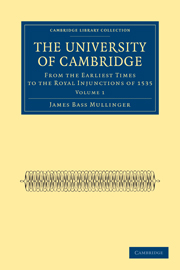Book contents
- Frontmatter
- PREFACE
- Contents
- CHAP. I FROM THE ROYAL INJUNCTIONS OF 1535 TO THE FOUNDATION OF TRINITY COLLEGE
- CHAP. II FROM THE FOUNDATION OF TRINITY COLLEGE TO THE ACCESSION OF ELIZABETH
- CHAP. III FROM THE ACCESSION OF ELIZABETH TO THE DEATH OF ARCHBISHOP PARKER
- CHAP. IV FROM THE DEATH OF ARCHBISHOP PARKER TO THAT OF LORD BURGHLEY
- CHAP. V COLLEGE LIFE
- CHAP. VI FROM THE DEATH OF LORD BURGHLEY TO THE ACCESSION OF CHARLES I
- APPENDIX
- INDEX
CHAP. IV - FROM THE DEATH OF ARCHBISHOP PARKER TO THAT OF LORD BURGHLEY
Published online by Cambridge University Press: 05 November 2011
- Frontmatter
- PREFACE
- Contents
- CHAP. I FROM THE ROYAL INJUNCTIONS OF 1535 TO THE FOUNDATION OF TRINITY COLLEGE
- CHAP. II FROM THE FOUNDATION OF TRINITY COLLEGE TO THE ACCESSION OF ELIZABETH
- CHAP. III FROM THE ACCESSION OF ELIZABETH TO THE DEATH OF ARCHBISHOP PARKER
- CHAP. IV FROM THE DEATH OF ARCHBISHOP PARKER TO THAT OF LORD BURGHLEY
- CHAP. V COLLEGE LIFE
- CHAP. VI FROM THE DEATH OF LORD BURGHLEY TO THE ACCESSION OF CHARLES I
- APPENDIX
- INDEX
Summary
Changes for the worse at both universities: (1) in the adoption of a less liberal constitution; (2) in a narrowed conception of their educational functions
Notwithstanding the increasing external prosperity of both Oxford and Cambridge during the closing years of Parker's life, the general efficiency of both universities appears at the same time to have undergone a material decline. Their former liberal constitution had been supplanted by the rule of an oligarchy which, however judiciously it might be administered, was singularly liable to abuse. The ancient and catholic conception of their functions as great schools of all the sciences and of all learning, had narrowed to one whereby they came to be regarded as little more than seminaries for the education of the clergy of the Established Church. In this change, however, they only reflected the dominant policy of the state. ‘There is no middle course in dealing with religious sectaries,’ observes Hallam in his admirable criticism of this period,‘between the persecution that exterminates and the toleration that satisfies;’ and the justice of this observation is forcibly attested by the history of the universities. Subscription, to the Thirty-nine Articles, enforced ceremonial in religious worship, were stumbling-blocks which more and more shut out the conscientious Puritan, with whom dissatisfaction developed into defiance and resentment into retaliation. The ‘non-complier’ became the seceder, the member of a distinct and fast multiplying sect, whose most zealous and unscrupulous representatives lampooned the bishops, derided the constitution of the lampooned the bishops, derided the constitution of the English Church, and advanced doctrines which seemed to not a few to threaten the stability of the crown itself.
- Type
- Chapter
- Information
- The University of Cambridge , pp. 250 - 371Publisher: Cambridge University PressPrint publication year: 2009First published in: 1873



